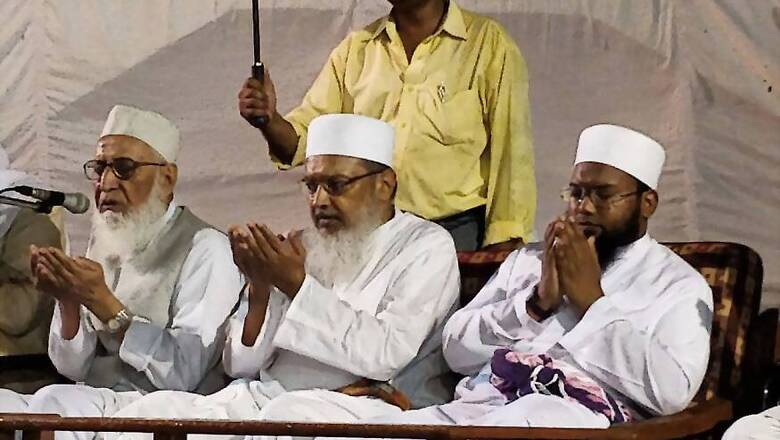
views
Bhopal (Khanugaon): The All India Muslim Personal Law Board (AIMPLB) on Saturday refuted the observation made by the Supreme Court that since triple talaq is sinful, it can’t be lawful. The personal law board further claimed that they will continue to practise Shariat, which provides for instant triple talaq.
The board said that it is a misconception and triple talaq can still be valid in law and never be disregarded, even if it’s sinful. During Sunday’s executive meeting, the board will be looking at finding legal solutions to the clash between Shariat and the Supreme Court ruling.
Supreme Court judge, Justice Kurian Joseph, while penning down the triple talaq verdict had unequivocally stated that "the practice of instantaneous triple talaq was something which did not have an Islamic sanction and since it was a sinful practice, it could not be valid in the eyes of law."
Drawing a comparison with adultery and robbery, Maulana Wali Rahmani, General Secretary of the AIMPLB, expressed surprise that "how educated people draw such conclusions".
"Yes, we had stated that instant talaq was a sinful practice, but how does it mean that what is sinful in the eyes of God cannot be valid in law. I don't know how educated people say that if something is sinful, can't be a part of the law. Suppose a robbery takes place, can you still say that since it's a sinful act, it did not happen. If a spouse commits adultery, will you say it did not happen because it is sinful?" said Rahmani.
Key members of the AIMPLB had gathered on Saturday at Khanugaon in Bhopal to address a gathering of Muslims just before the scheduled executive board meeting on Sunday to “clear out certain confusions” and make sure “there is complete support to implement the decisions that will be taken on Sunday”.
Though the SC verdict on triple talaq ran into hundreds of pages in which the court discussed the validity of the practice of instant talaq, Rahmani termed the discussion, “a miniscule part of the verdict, with the larger picture being the insulation given to personal laws”.
"Nullification of triple talaq is a very small part of the verdict. We follow Shariat and Shariat provides for instant triple talaq. We believe in triple talaq and it must and will go on. The fact remains that whoever still practices triple talaq will still continue to severe ties with his wife and it will not change. How to implement this is headache of court and government," said Rahmani to the gathering which was by now nodding their heads in agreement.
Later, Rahmani told News18 that while the SC verdict looks at the aspect of triple talaq in Muslim Personal Law, it clashes with the Shariat. "This conflict will be reduced on legal grounds in Sunday’s meeting," said the General Secretary.
The board members did not hesitate to elaborate on why women were not given equal rights to divorce in Islam and attributed it to their "frivolous temperament" and "unwise decision making".
Maulana Mohammad Umrain Mahfooz Rahmani, Secretary of AIMPLB said that if a woman was given the rights to divorce equally, then "most of the families would have been broken by now with unhappy marriages".
"The woman have not been given the right because they get angry very soon and have no control over their temper. It would have destroyed a lot of families by now. Hence, this law is justice not only for men but also for women. It is the beauty of Islam that women have been given rights but within its boundaries," said Rahmani.
In Islamic law, although all options of divorce have been given to men, Khula as an option can be exercised by a woman to seek divorce on her own but with the consent of the husband.
Rahmani, however, buttressed his point that "talaq is not the problem but a solution to the problem" and that "a negative image about the community was being created".
"People are trying to tamper with the Shariat. The law of Allah cannot be wrong. Talaq is not a mode of injustice or oppression and the Prophet, in his last sermon called for respecting woman," the secretary said.
Rahmani went on to compare the women who were given talaq, with the ones who were abandoned in other religious communities. AIMPLB stated that talaq "was an easy way out rather than dragging it for saat janam (seven lives)”.
"There are men who have abandoned their wives and have not seen them for years. The prime example of this is our Wazir-e-Azam, Prime Minister Modi. His poor wife is still waiting for her husband, but he never cares to visit her. Look at the widows of Vrindavan and what they go through," said Rahmani.
The board also cited crime records on domestic violence and stated that the communities which do not have the quick form of divorce often witness a higher number of suicide and domestic violence cases.
With the tussle of Shariat and Constitution flaring up after the Supreme Court verdict, AIMPLB is seeking options from legal experts to construe a harmonious way out.
Khalid Rashid Firangi Mahli, a member of AIMPLB told News18, "We are going to consult a host of legal experts on Sunday to suggest us how can we avoid Shariat’s clash with the SC verdict."




















Comments
0 comment